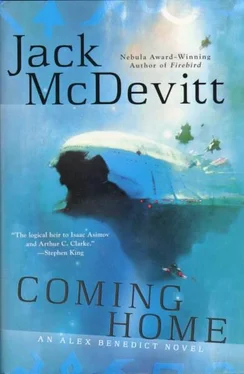* * *
I’d picked up a jigsaw puzzle at the space station. A real one where you actually need a table. It was two thousand pieces, and depicted the Hadley Telescope against an array of stars and a service vehicle. I set it up in the passenger cabin. Alex watched as I started on it, said nothing for a few minutes, and finally asked whether I could finish it before we had to change course or velocity, which would scatter the pieces. “That’s what makes it interesting,” I said.
He laughed. But it didn’t take long before he joined me.
We worked on it for much of the first day. That evening, he suggested we watch Casablanca . I wasn’t exactly reluctant, but I’d been looking forward to seeing Gentlemen Prefer Blondes .
Alex said, “Whatever you like.” But he looked disappointed. I knew the game, but I caved anyhow, and we went with Casablanca .
I’ll confess that I loved the film. And I was surprised to discover that another of my favorite songs, “As Time Goes By,” provides the central theme. When it was done, I watched with tears in my eyes as Rick and Captain Renault walked off across the airfield.
* * *
In the morning, I went back to work on the puzzle while Alex stared at the incoming pictures of Larissa. We were still twenty hours out. The moon isn’t much more than a large chunk of rock shaped like a potato, with a length of about two hundred kilometers. It orbits Neptune twice daily.
After a while, I went over and sat down beside him. I looked at the images of a bleak moonscape coming in through the scopes. “Where do you think they would have put the station?”
“The accounts don’t say, but I can’t believe they didn’t have it on the side facing the planet.”
“Okay. That makes sense. Did the station have a name, Alex?”
He had to look it up. “Landros. He was the commander of the first mission to get out this far.”
There was a sudden flash directly in front of us. A rock, maybe, or even some dust, had drifted in and gotten eradicated by the laser.
Alex cleared his throat. “You know,” he said, “I’m not sure it wouldn’t have been better to leave the artifacts to the looters rather than bury them out here. If that’s what they did. There’s something basically indecent about hiding things in a place like this.”
“Especially,” I said, “if you forget about them and leave them here.”
He nodded. “That’s what I mean.”
* * *
We turned the scopes on Larissa as we approached but saw nothing other than rock, broken ridges, promontories, and craters. Then it slipped behind Neptune.
It needed only a few minutes to reappear. I sensed an air of desperation as Alex manipulated the images we’d been getting, shifting angles and adjusting magnification and seeing nothing but desolation. “We need to be closer to make anything out,” he said. “Just put us in orbit around the moon, and we should be able to find the station easily enough.”
Neptune has five rings. Larissa, at a range of eighty-five thousand kilometers from the planet, lies outside the ring system.
The gravity level on the moon is almost nonexistent. I’d have weighed about four pounds on the surface. When, finally, we got close, I folded a sheet, placed it over the puzzle (which was about half-finished), and taped it down. Then I eased us into orbit.
Alex sat by a portal staring out as the moonscape moved slowly past.
We spent the better part of a day in orbit and saw nothing but craters and rocks. “We have to get closer,” he said.
“That means we’d have to burn a lot of fuel. It doesn’t have the gravity to support—”
“Give me a suggestion.”
“How about we leave Belle in orbit and use the lander.”
* * *
We climbed into the lander and launched. I took us down to an altitude of about six hundred meters. “This place looks so dreary,” I said. “It’s hard to believe anybody would have left something valuable out here.”
“That’s precisely what makes this the perfect sanctuary,” said Alex. He was sitting up front with his jaw propped against one fist, staring out at the ground passing beneath us. We were moving faster than we had been in the ship. “Have faith.”
“Somebody told me once that’s a good way to get into trouble.”
We didn’t know what the base looked like. The only thing we could be relatively sure of was that it would have been constructed on an elevated area.
Alex was beside me in the right-hand seat. We were both wearing goggles which, at least theoretically, made it easier to see in the azure glow of the giant planet. His lips were set in a thin line. “It has to be here somewhere,” I said.
“Let’s hope so.”
* * *
Larissa was, of course, in tidal lock. The sun was too far away to be anything more than a bright star. The lighting, enhanced by a ring system that rose almost vertically into the sky, produced a terrain that seemed utterly unreal. We were constantly seeing shapes that did not exist, braking, going down, moving to starboard, doing whatever was necessary to change our angle. Each time, as our spotlights touched jewel-like azure objects, they went away, and we were left only with rocky escarpments and crags.
After about two hours, Alex pointed. “There it is.” There was a note of triumph in his voice. We were looking down at what appeared to be a cluster of connected cubes and domes spread across varying levels of the moonscape.
I took us lower. This time the object did not blink out.
* * *
There was a reasonably flat area within a few hundred meters. I took us in and touched down. We sat for a while, studying the structure. It was perched across the top of a pair of ridges. There was a telescope and scanners and radio antennas. Dark ports looked out at us. Eventually, we got up and climbed into pressure suits. We checked air supplies and radios, and when we were ready, Alex led the way out through the airlock. We walked carefully through the almost nonexistent gravity, resisting the temptation to do any jumping. We climbed to the top of the ridge, looked up at a wide, flattened dome. A walkway that took us directly to a hatch.
There was a portal on either side. Both were dark. We pointed wrist lamps into them and saw furniture. Tables, chairs, sofas. “I think,” said Alex, “there might be some valuable stuff here.”
A pad was located beside the hatch. He touched it. When nothing happened, he pressed harder. “Not working,” he said.
We rounded the building and saw more structures of varying shapes. There was nothing elaborate, just modular parts that fit together like a large puzzle. They were all connected and stood at varying elevations on that uneven ground. A block-shaped building supported a group of scanners and dishes. It was at the highest point in the network and was linked to the dome by a bridge. In the distance, separated from everything else, we saw a collapsed telescope, the tube still attached to the mount but lying on a few rocks.
The block-shaped building had another airlock. This one worked.
I jumped when lights blinked on. And I heard Alex swallow. “Somebody’s done some maintenance,” I said.
“Maybe.” The lights were all outside. A luminous line had also appeared, framing the hatch. And a single lamp hidden in the wall lit up the entry. The hatch rolled into the overhead, and more lights came on inside the airlock. Alex looked back at me. “Stay here,” he said. “Let’s make sure this thing works before we go any farther.”
He went inside, touched something, and the hatch closed. “So far so good,” he said. “It’s running air into the chamber.”
Читать дальше












